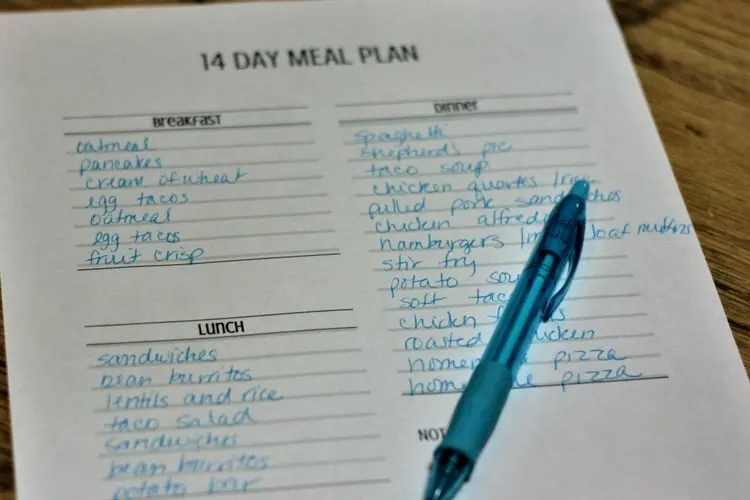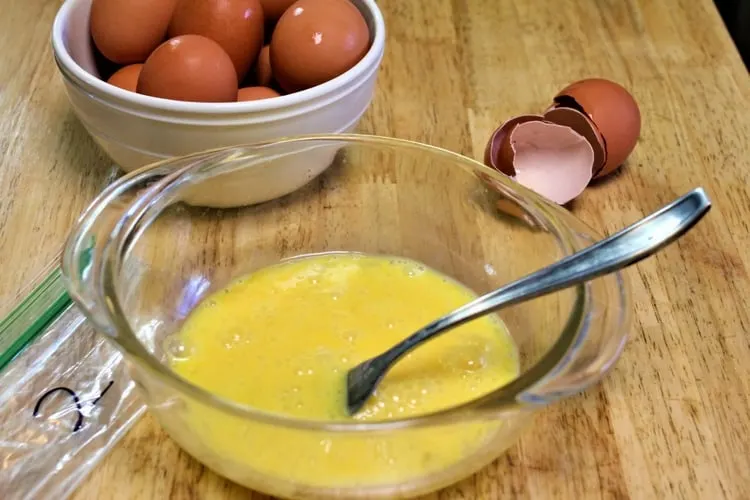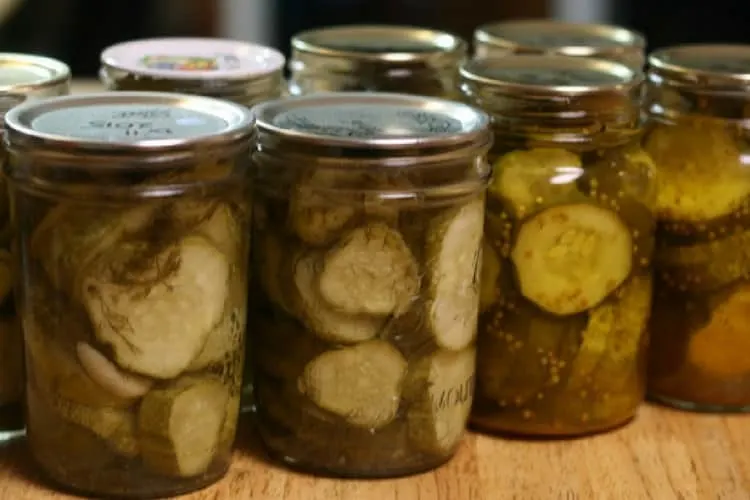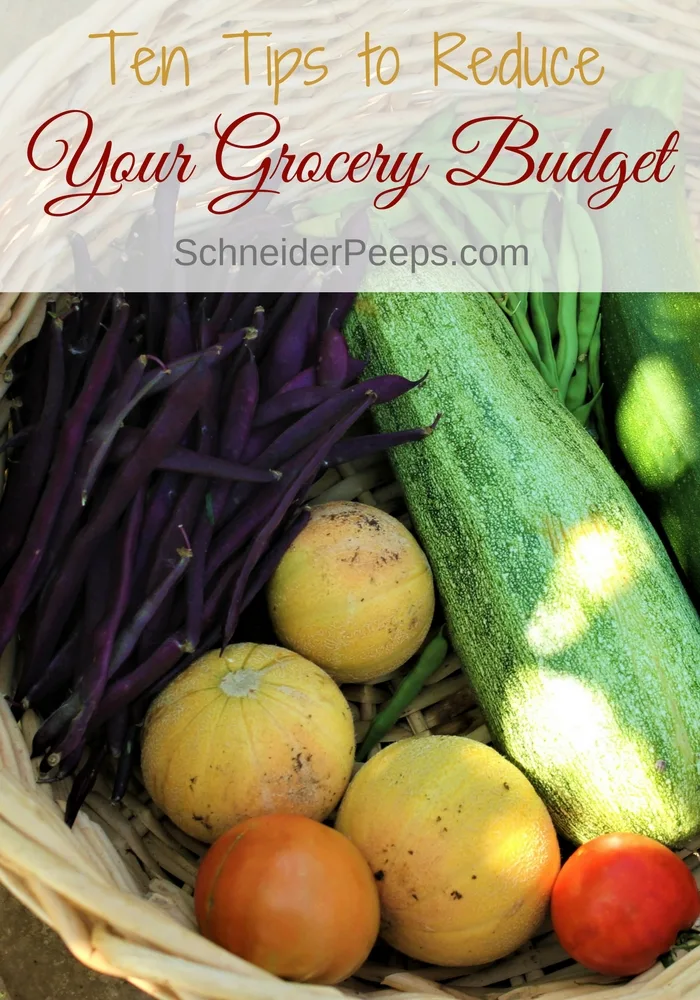
I’ve always believed that that of all our budget categories, the grocery budget is the easiest to save on from month to month. For the most part, there’s very little you can do about your mortgage, there’s only so much you can do to reduce energy costs, and I don’t know about you but our insurance costs are pretty much the same every month. But the grocery budget, that’s different, I have complete control over that. I’m not talking about using coupons or buying cheap low quality food. By striving to keep a zero waste kitchen I’m able to make the most of my grocery dollars.
I don’t know that I’ll ever achieve having a zero waste kitchen, but it’s still something I strive for. I’m most successful when I slow down and I’m mindful of what we have “in the pantry.” When I talk about our pantry I really mean our supply of food, not just the physical pantry. I include the refrigerator, freezer, the 5 gallon buckets in the garage, the home canned goods under our bed, and the garden produce….all the food we have on our property when I say “in the pantry.”
I keep a list in my weekly planner of groceries that we’re out of or running low on. I usually go grocery shopping once a week and it’s nice to have this list already made. I don’t rush around going to different stores, just one a week but I use my list to decide which store to go to. I don’t always get everything on my list. If I have peanut butter on the list and I’m not going to to the store that has the large natural peanut butter that I like, we go without until I go to that store. And that brings us to my first tip, it’s really okay to go without something for a a few days.

Plan your menus every week. There are many ways to menu plan so work out a system that suits you and stick with it. I usually plan our menu based around what’s in the garden and what meat we have from our meat order. But when there are busy seasons I use a 14 day meal rotation that truly saves me time and money. There’s no need to get all hung up on planning perfect meals, your family just wants food. I promise.
Bring a cooler and bring groceries home as soon as possible. You never really know what can happen on the way home from the grocery store, so take a cooler to put your frozen food and dairy products in. Rarely will leaving dairy products out make them spoil right away but it will make them spoil faster than if they are kept cold. When you get home, put everything away immediately, starting with the cold products.
Use the perishables in the fridge before you buy a new batch. Since I only shop once a week I’ll often buy perishables that we’re low on but not completely out of. However, I store them in our outside refrigerator until the same item in our inside refrigerator is all gone. When I put fruit away, I pull out all the fruit in the refrigerator and put it in a bowl on the table to be eaten first.
Put flours and grains in the freezer. Before putting dried goods such as flour and grains in your pantry or stockpile, place them in the freezer for two days to kill any larvae present. There’s nothing worse that opening a bucket or bag and seeing something crawling in your half gone oats. By that time, you know you’ve already eaten the bug eggs. So, I like to just go ahead and freeze any flours or grains for a few days. Then I never know if there were bug eggs in the grains and I can pretend that doesn’t happen.

Freeze food to extend it’s life. If I notice our milk is starting to get sour or we have an overabundance of eggs, I put them in the freezer. If we have leftovers that I don’t think we’ll eat before they spoil, I”ll pop them into the freezer.
Use a dehydrator. You can dehydrate almost anything and reconstitute it later if you wish to. I usually just dehydrate things that I’m going to use dehydrated – bananas, herbs, apples, etc.
Use your leftovers. Add a leftovers day to your menu plan, or use leftovers from the evening meal for lunch the following day. You can also turn today’s leftovers into a completely different meal for tomorrow.

Rotate your stockpile. Add new products to the back of the stockpile and move older food to the front, just like they do in the stores. During canning season, I pull everything out from the previous year and put it in a box in the kitchen and make sure everything has the previous year’s date on it. After I’m done canning, I put the items back in the pantry but in the front.
Store your food properly. Don’t store potatoes or onions in plastic bags as they’ll rot, particularly in hot and humid weather. You can wrap celery in aluminium foil – it will keep well for six weeks, still crisp. Store most vegetables in air-tight plastic bags rather than just loose in the crisper.
Don’t overlook the little things. Like most things in life, it’s not the huge, once in a while things that have the most impact. It’s the small day to day, repetitive things that will make or break your budget. Those little things add up. For instance, my kids love smoothies but they can be expensive to make. So they have to put one banana and a couple of frozen figs in their smoothies as a base. Bananas are cheap and the figs are free from our tree. Two figs doesn’t seem like it would make much of a difference, but over time, two figs in each smoothie adds up to a couple of pounds of fruit a week. I also have a plan for eating well between seasons.
Limit disposables. This is a touchy subject, I realize that, but if you really want to save money in the kitchen stop, or at least reduce, buying things whose purpose is to be thrown away. Years ago we stopped using paper towels….for the most part. We keep a roll at the back of the pantry for extreme emergencies, it usually lasts over a year. You can make your own “unpaper towels” or use inexpensive wash clothes and towels. If you crochet or knit you could even make your own. Each evening I make sure that the wash cloths (usually just one or two) and kitchen towels are hung or laid out so that they dry overnight. In the morning they go to the laundry room to be washed with that day’s laundry.
What are some of your tips to reduce your grocery budget?


Christina
Saturday 12th of February 2022
You said "Bring a cooler and bring groceries home as soon as possible. You never really know what can happen on the way home from the grocery store, so take a cooler to put your frozen food and dairy products in." I bring the cooler and/or insulated bags for the opposite reason. In the winter, as I live in MN, I use them to put my fresh greens and fruits in so they don't start to freeze on my long drive home from the store!!! Even with the heat on, the back hatch area of the car can be quite cold, and particularly for items like Basil or lettuce!
Angi Schneider
Friday 18th of February 2022
oh, that's a good point! Thanks so much for sharing.
Cheri Scott
Sunday 15th of April 2018
I put all veggie trimmings, onion skins and roots, even apple cores in a bag in the freezer. Do the same with all meat bones separated by type. When I have a full bag they all go into the crockpot overnight to make great no salt, no-cost stock. Some I freeze in 1 to 4 cup containers, some gets used for a meal that day. I LOVE making something out of "nothing"!
Angi Schneider
Sunday 15th of April 2018
Thanks so much for sharing Cheri! I also love making something out of "nothing". It truly is amazing how much good stuff with can make with things we'd normally toss.
Dee
Wednesday 11th of April 2018
If you buy veggies like broccoli or othera that need a bit of prep before eating do all of them at one time...instead of being forgotten they qill be more apt to be used when ready to go....plus the chickens are happy for the trimmings! Also if your kids tend to skip the fruit like mine ...i sliced up apples, carrots,etc. And set by them while they are studying...seems to always disappear
Angi Schneider
Wednesday 11th of April 2018
Great ideas! Thanks for sharing, Dee.